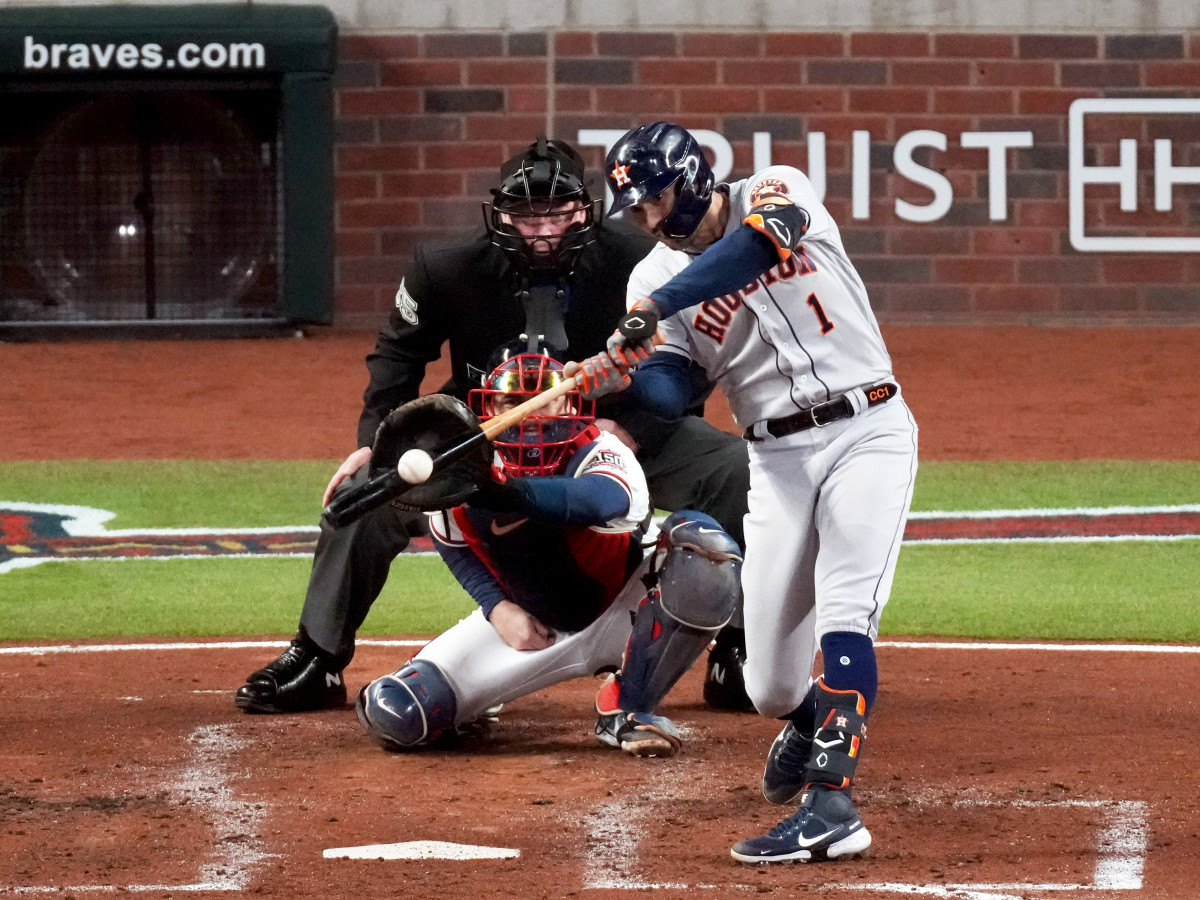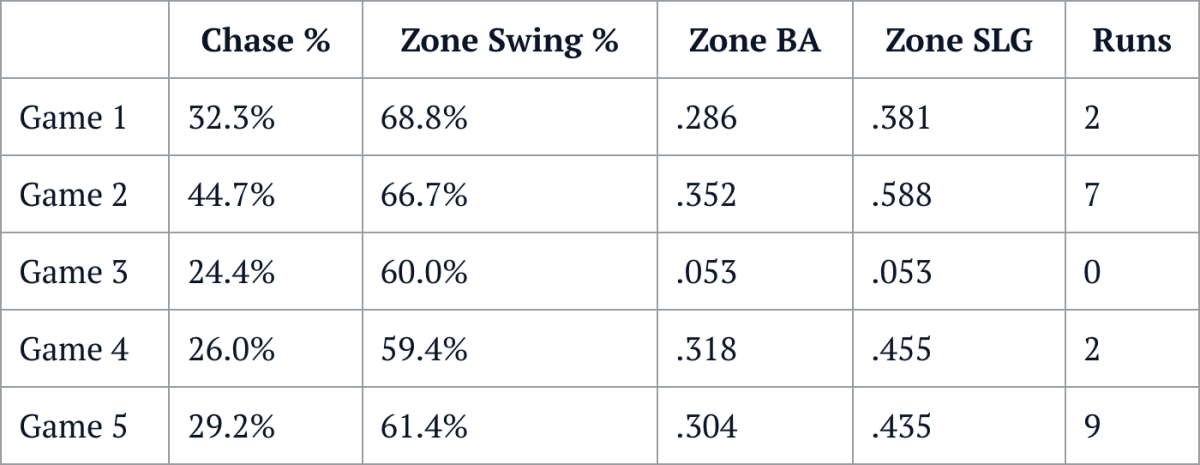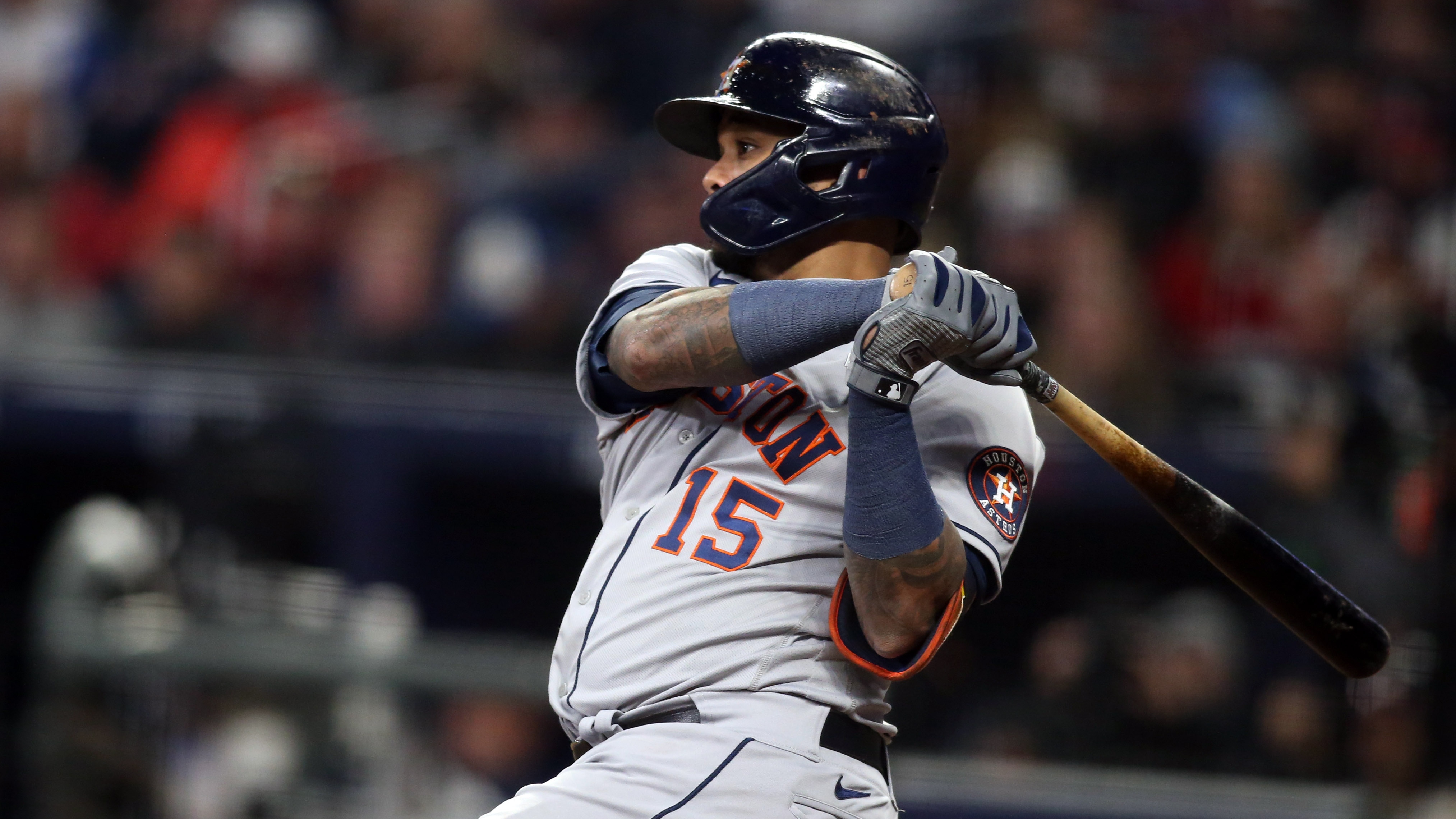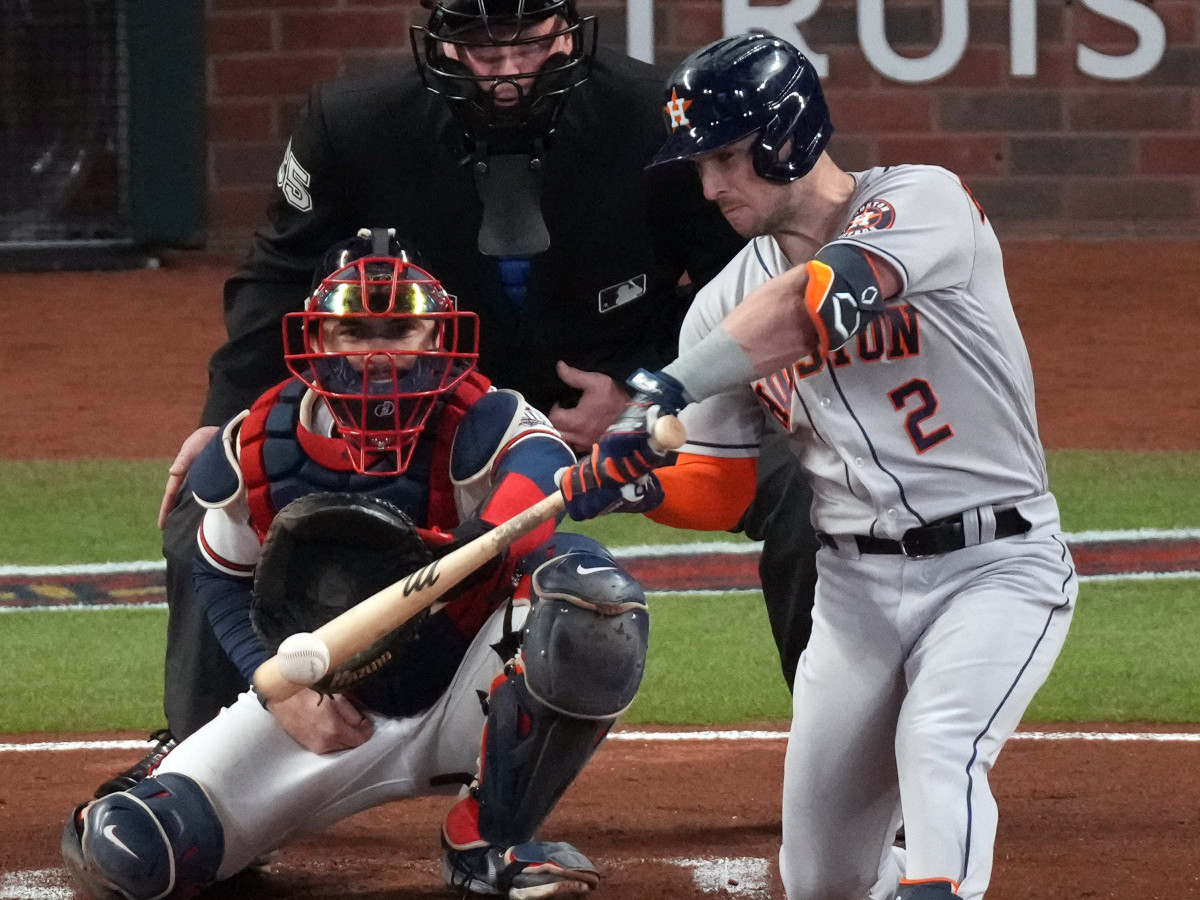The Astros Aren't Done Yet. Here's Why.

You didn’t think it’d be that easy, did you? The Astros were the best hitting team in baseball this season; they weren’t going to go down without their bats waking up.
Instead, facing elimination in last night’s Game 5, they came from behind twice and then kept tacking on more runs in their 9–5 win over Atlanta at Truist Park. This performance was far more indicative of what Houston is capable of doing. Now, it heads back home to play Game 6 tomorrow and, if necessary, Game 7 Wednesday. If anyone tells you they know what’s going to happen next, they’re either a member of one of the two teams or blowing more smoke than the home run train conductor at Minute Maid Park.

A longer World Series was supposed to favor the Astros, even before they fell behind three games to one. Their lineup is one of the best in recent memory at making adjustments to pitchers the more often their hitters face them, and we finally saw that happen last night.
For the third time in the series, Atlanta manager Brian Snitker brought in A.J. Minter to preserve a lead. Minter had allowed three runs all postseason, and never more than one in a game. He’d matched that by the time he was relieved with two outs in the fifth. Every pitcher is going to have an occasional bad outing. What should concern the Braves, though, is the way in which Houston got to their lefthander.
Minter’s best pitch is his cutter. In his 14 playoff appearances this year entering last night’s game, he’d thrown it 58.2% of the time and held opponents to a .100 batting average (2-for-20) with no walks against the pitch. It made sense, then, that he’d give the Houston hitters a heavy dose of cutters last night. They knew this, and they were ready for it.
Carlos Correa and Yuli Gurriel both hit two-strike singles off cutters, and with two outs and the bases loaded, catcher Martín Maldonado, expected nothing but cutters when he stepped into the box.
“I told the guys, ‘If I get the bases loaded, I’m going to stand on the plate,’ ” Maldonado told Tom Verducci. “I might get hit with a cutter.”
As Correa recalled, Maldonado said before he faced Minter: “He’s throwing cutters in. I’m going to go Little League mode and get on top of the plate and make him feel uncomfortable.”
The Astros catcher, who is one of the worst hitters among everyday players in league history, walked on five pitches, three of which were cutters. The only strike was a belt-high, 2-and-0 four-seamer. It was over the outer third of the zone, but because Maldonado was crowding the plate, it was the perfect pitch, about as middle-middle as 2-and-0 cookies come—that is, if the batter actually wants to hit it. Maldonado had no intention of swinging the entire plate appearance. He knew that by standing that close to the plate against the cutter—which runs in on righthanded hitters—he’d either get hit with the pitch to force in the game-tying run, or he would make Minter worry about hitting him with the pitch and, in turn, cause the pitcher to lose his command. The next batter, Marwin Gonzalez, also knew to hunt for cutters. He looped the first pitch from Minter, a waist-high, 88.9-mph cutter into left for a go-ahead two-run single.
The offensive resurgence was about more than just that inning vs. Minter. The Astros' approach has shifted throughout the series, and it is more in line with what they did during the regular season, when they had the sixth-lowest chase rate (25.6%) and third-lowest swing rate on pitches in the zone (65.8%) in the majors. Their approach is more than just working deep counts. Their .518 slugging percentage on pitches in the zone was the third-best in the majors. They were the only team to rank in the top 10 for each of these three categories. Unlike the Yankees, Houston wasn’t only taking pitches and letting hittable ones go. And unlike the Blue Jays, Red Sox and Braves, the Astros weren’t just hacking at everything they saw in the zone. (Atlanta led the majors with a 71.8% in-zone swing rate.)
This context is important to understand why this could be Houston’s year after all. Plate discipline is more than just taking pitches out of the strike zone, though. It’s also knowing which strikes to swing at to reach base and/or do the most damage.
Here are Houston's game-by-game plate discipline numbers in the World Series:

That Game 3 is the outlier. The Astros were two-hit, and as their manager Dusty Baker noted afterward, Atlanta's Ian Anderson was effectively wild. Hitters were all out of whack. It was damp and rainy, and the bleh kinda night certainly could've made it far more difficult to pick up pitches. Neither team hit well, and it seems that it was better for the Braves that their starter had trouble with his command.
It makes sense they were swinging a lot in Game 2, because Atlanta starter Max Fried hardly walks anyone (1.55 BB/9 in the second half of the regular season) and gives up even fewer home runs (0.55 HR/9 in the second half). To beat him, you've gotta put the ball in play and hit the pitches he throws in the zone early in the count. They did that, and they scored seven runs.
In Game 1, they also swung more than they typically do, which could've been the result of facing four of Atlanta's best relievers for the first time in the series. They certainly prepped by watching video, but they hadn't yet seen them live. That makes a difference.
There isn't much of a difference in Houston's approach between Game 4 and Game 5. The lineup's swing profiles for each game, as well as the production on pitches in the zone, are quite similar. If anything, besides the seven fewer runs, the Game 4 profile looks better: lower chase rate, higher in-zone swing rate, better in-zone batting average and slugging percentage. Instead, last night, the Astros finally started hitting with runners in scoring position. Across the first four games, they were 4-for-31 (.129) with RISP; last night they were 5-for-15 (.333).
I'm curious to see what happens tomorrow night, when the Astros will once again face Max Fried. My guess is they'll revert back to the heavy-swing approach that worked in Game 2, knowing Fried will be around the zone early in the count and that he won't give them too many pitches to lift for home runs.
Then again, as we've seen throughout the postseason, none of us really know what's going to happen.
Have any questions for our team? Send a note to mlb@si.com.

1. THE OPENER
“There was so much to admire about Game 5 on a grand scale. If this turns out to be the end of original baseball—the last game played in which all players must play offense and defense if the powers that be are bent on homogenizing baseball with the universal DH—this was a fitting breakup."
That’s Tom Verducci, summing up the thrills, tricks and treats of last night’s game on Halloween. There was Maldonado, “who came disguised as a Little Leaguer.” There was Zack Greinke, who considers himself the Babe Ruth of pitcher-onlys, lacing a pinch-hit single to right field. There was Marwin Gonzalez, “who had not driven in a run in 40 days getting the go-ahead pinch hit.”
Read Tom’s entire story here.
2. ICYMI
Wondering what’s going on with the slumping Alex Bregman? We’ve got the inside story on what broke his swing.
Alex Bregman Still Searching for His Swing Ahead of Game 6 by Stephanie Apstein
He responded to being dropped in the batting order with an RBI double last night, but he’s still off his game. A September wrist injury could be the reason why.
Want to know how Atlanta manages all the pitchers it’s using? We did, too. Here’s the answer:
Warm Blanket: Travis d'Arnaud Is Providing Security Amid the World Series Chaos by Emma Baccellieri
The Braves catcher is tasked with preparing their pitching strategy, even when he has no idea who is going to pitch. Yeah, it’s complicated.
Miss Tom Verducci's story about the Crash Davis of managers? You can find that here:
The Greatest Twenty-One Days of Brian Snitker’s Life by Tom Verducci
He has given the past 45 years of his 66-year-old life to the Braves as a player, coach and manager on various levels. Now he's one win away from a World Series title.
3. WORTH NOTING from Tom Verducci
The Astros took batting practice on the field before Game 5. The Astros broke out of a hitting slump with nine runs in Game 5. Coincidence? No. There was something to it.
Only four Houston players had played at Truist Park before the World Series—and not in at least four years. Rain for three days canceled pregame work. The first pitches they tracked in an unfamiliar park were in World Series game competition.
“You want to be able to feel the atmosphere, hear the crowd,” bench coach Joe Espada said. “You don’t want to step outside at 8 o’clock and all of a sudden feel it. Our group likes to work, and they seemed cooped up inside.”
“Like a dungeon,” manager Dusty Baker said. “This game felt like the World Series.”
It helped Alex Bregman in particular. He took early and regular hitting on the field, working on finishing his swing with two hands for the first time in his career. He roped an RBI double his first time up. And while he didn’t finish entirely with two hands, he said “it was long enough. It was better. I’ll continue to work on it.”

4. WHAT TO WATCH FOR from Will Laws
With the series’ shifting back to Houston, the DH rule once again will be in effect. That likely moves Joc Pederson into Atlanta’s starting lineup, as the Braves must hope he can conjure up some more “Joctober” magic now that the calendar has turned to November. Pederson has faded after a scorching start to the postseason, going hitless in his last 10 at bats and is 2-for-22 with one walk and seven strikeouts dating back to Game 5 of the NLCS. His lone hit in the World Series came in his first plate appearance, a single off Framber Valdez in Game 1. The Braves could use more production from the bottom of their lineup, and the pressure will be on the lefthanded Pederson to deliver against Game 6 starter Luis Garcia and the parade of righty relievers who will probably follow.
5. THE CLOSER from Emma Baccellieri
Brian Snitker and the Braves made it through their back-to-back bullpen games with one win and one loss. Was that managerial experience as difficult as Snitker had expected? “Every bit,” he said Sunday night. “That's just a lot of innings to cover against a club like this that swings a bat so well.”
But their pitching plan gets much easier from here. Max Fried will go in Game 6, and if there’s a Game 7, they’ll have Ian Anderson. Plus, the travel day on Monday helps ensure that their bullpen will be well rested for Game 6—particularly since only one of their top-shelf relievers, A.J. Minter, pitched in Game 5. Tyler Matzek, Luke Jackson and Will Smith all had the night off. So if Fried runs into early trouble again, Snitker will have plenty of options at his disposal, and he shouldn’t hesitate to use any of them.
That’s all from us today. We’ll be back in your inbox tomorrow. In the meantime, share this newsletter with your friends and family, and tell them to sign up at SI.com/newsletters. If you have any questions or comments, shoot us an email at mlb@si.com.
